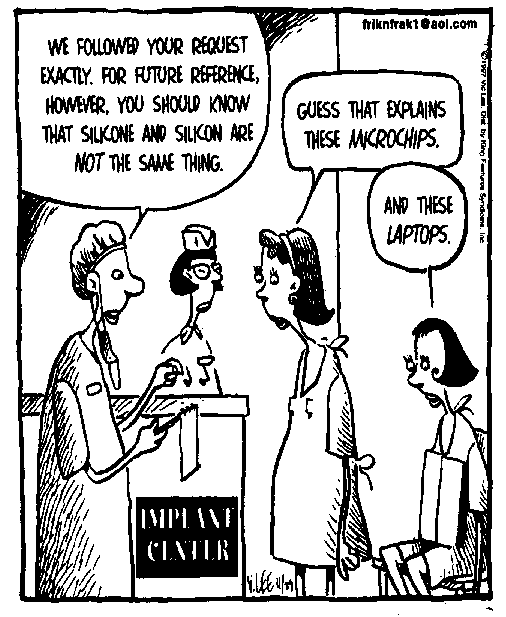Revised as of
2 Oct 2022
I gotta confess that I didn’t know there was a difference, and now I know that silicon is used in hard applications: computer parts, electronics, that sort of thing. Silicone is much more flexible, in every sense of the word.
Almost all of us encounter silicone everywhere in our lives: ice cube trays, potholders, the caulk that keeps moisture from seeping into places it shouldn’t, breasts, anti-graffiti paints, household care products, and so much more! It’s like the corn of the products world.
Word Confusions . . .
. . . started as my way of dealing with a professional frustration with properly spelled words that were out of context in manuscripts I was editing as well as books I was reviewing. It evolved into a sharing of information with y’all. I’m hoping you’ll share with us words that have been a bête noire for you from either end.
If you found this post on “Silicon vs Silicone” interesting, consider tweeting it to your friends. Subscribe to KD Did It, if you’d like to track this post for future updates.
| Silicon | Silicone |
|---|---|

I Need Help courtesy of University of Kentucky. — Nope, you don’t want silicon of any kind used for breast enhancement. |
Silicone Tube is Дap Beтep’s own work under the CC-BY-SA-3.0 or GFDL license, via Wikimedia Commons. |
| Part of Grammar: | |
| Noun
Plural: silicons |
Noun; Verb, transitive
Plural for the noun: silicones Third person present verb: silicones |
| Computer and electronic parts
The chemical element of atomic number 14, a nonmetal with semiconducting properties, used in making electronic circuits that’s found in the earth’s crust and is used especially in computers and electronics. Its symbol is Si. |
Products that soften, gloss, make flexible +++
Noun: Any of a class of synthetic materials that are polymers with a chemical structure based on chains of alternate silicon and oxygen atoms, with organic groups attached to the silicon atoms. Such compounds are typically resistant to chemical attack and insensitive to temperature changes. They are used to make rubber, plastics, polishes, and lubricants. Verb, transitive: Join or otherwise treat (something) with a silicone. |
| Examples: | |
| Pure silicon exists in a shiny dark gray crystalline form and as an amorphous powder.
Silicon has the same crystal structure as diamonds. Silicon is the basis of the widely used synthetic polymers called silicones. |
Noun: Silicone is used in breast implants, molds, special lenses, sealants, and more. Silly Putty has silicone in it. Silicone is typically resistant to chemical attack and insensitive to temperature changes. Verb, transitive: |
| History of the Word: | |
| The first known use was in 1817.
Early 19th century as an alteration of the earlier silicium from the Latin silex, silic- meaning flint, on the pattern of carbon and boron. |
The first known use was between 1905-10 as silic(on) + -one. |
C’mon, get it out of your system, bitch, whine, moan . . . which words are your pet peeves? Also, please note that I try to be as accurate as I can, but mistakes happen or I miss something. Email me if you find errors, so I can fix them . . . and we’ll all benefit!
Satisfy your curiosity about other Word Confusions on its homepage or more generally explore the index of self-editing posts. You may also want to explore Book Layout & Formatting Ideas, Formatting Tips, Grammar Explanations, Linguistics, Publishing Tips, the Properly Punctuated, Writing Ideas and Resources, and Working Your Website.
Resources for Silicon vs Silicone
Apple Dictionary.com
Pinterest Photo Credits:
Quartz Brésil is Didier Descouens’ own work under the CC BY-SA 4.0 license in contrast with Blue Silicone Dildo by Eva K., which is under the GFDL 1.2 or FAL license. Both are via Wikimedia Commons.

